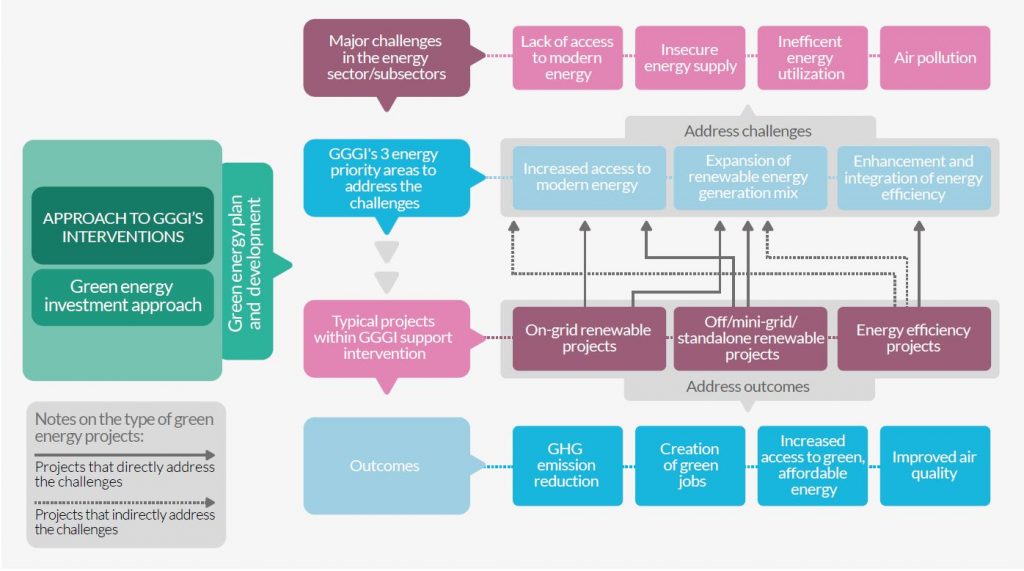At a Glance
| Publication Date | December 2017 |
|---|---|
| Format | |
| Thematic Area | Sustainable Energy |
GGGI’s Technical Guidelines on Green Energy Development, the 4th in the series of GGGI Technical Guidelines, published by the Global Green Growth Institute (GGGI). GGGI developed this Green Energy Development Guidelines based on its experience in providing green growth and energy support to member countries.
The Guidelines are developed to assist member countries in developing strategic green energy development plans and implementation road maps at every stage of the GGGI value chain. They serve as reference for government officials of GGGI member countries, GGGI staffs and consultants, development partners, and relevant stakeholders who are working on areas related to or looking to develop a project on green energy.
GGGI developed the Green Energy Development Guidelines to:
- Provide guidance to GGGI member countries in identifying, developing and mainstreaming green and inclusive renewable energy and energy efficiency pathways into the national energy sector/subsector strategies and plans to, Achieve sustainable economic, social and environmental development;
- Provide guidance beyond traditional environmental policy formulation, utilize sustainable and strategic planning tools, outline the key concepts of low-carbon energy supply and energy efficiency and provide an overview of services GGGI offers to partner governments; and
- Support green energy planning, which is crucial for stakeholder engagement and consultation, and decision-making on energy-related objectives, targets, measures, implementation, and monitoring and evaluation systems.
The guidelines focus on desired outcomes for GGGI’s energy interventions, approaches and project focal areas. GGGI’s work in the energy sector directly contributes to four GGGI’s strategic outcomes (access to services, GHG reduction, green jobs and air quality), which are aligned with the energy targets and actions reflected in NDC commitments under the Paris Agreement and in Sustainable Development Goals (SDG 7).
GGGI’s energy intervention prioritizes three areas: expanded access to affordable sustainable energy access, improved sustainable renewable energy generation mix, and enhancement
and integration of energy efficiency

Figure: Presents GGGI’s energy intervention approach and priority focus areas to address the energy sector challenges and meet the desired outcomes.
The guidelines composed of Four Major Phases to plan and develop green energy projects through the four phases of the GGGI value chain and outlines twelve major steps across the GGGI value chain, each with detailed explanation and schematics.
Phase I: Diagnosis
Phase II: Green Impact Assessment
Phase III: Energy sector/subsector strategy and planning (With 8 steps)
Phase IV: Design, Financing and Implementation (4 Steps).
The target users of these guidelines include green growth and energy experts and practitioners, project developers and planners, and relevant national and international development partners in GGGI member countries. Depending on local needs in partner countries, GGGI’s country programs focus on identifying policy, planning and regulatory barriers for scaling up renewable energy, or removing financial barriers through specialized investment services for scaling renewable energy generation, access to sustainable energy services and energy efficiency.
The guidelines are neither a manual nor a step-by-step toolkit. Rather, they offer general guidance for the process of identifying, prioritizing, planning and implementing green energy development pathways along the GGGI value chain. GGGI advises users to use additional guidance, handbooks and tools during the planning and implementation of renewable energy and energy efficiency projects to develop in-depth knowledge and skills.
If you have any questions, comments or suggestions, please contact Dereje Senshaw